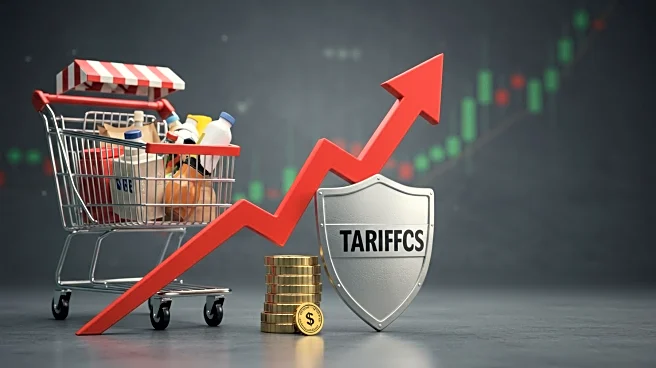What is the story about?
What's Happening?
U.S. wholesale inflation experienced an unexpected surge in July, driven by President Trump's tariffs on imports. The Labor Department reported a 0.9% increase in the producer price index, marking the largest jump in over three years. This rise in wholesale prices, which are up 3.3% compared to the previous year, suggests that importers are currently absorbing the costs of tariffs rather than passing them onto consumers. However, economists warn that these costs may soon be transferred to consumers, potentially exacerbating inflation concerns. Core producer prices, excluding food and energy, also saw a significant increase, rising 0.9% from June and 3.7% year-over-year.
Why It's Important?
The surge in producer prices is significant as it indicates potential inflationary pressures that could affect consumer prices. With tariffs contributing to higher costs for importers, there is a risk that these costs will eventually be passed onto consumers, leading to increased prices for goods and services. This development poses challenges for the Federal Reserve, which aims to maintain inflation at a 2% target. The current rise in wholesale prices could complicate monetary policy decisions and impact economic stability. Businesses may face increased operational costs, affecting profitability and potentially leading to price hikes for consumers.
What's Next?
Economists predict that if importers begin passing tariff-related costs onto consumers, inflation could rise further, impacting purchasing power and economic growth. The Federal Reserve may need to reassess its interest rate strategy to address these inflationary pressures. Businesses might explore cost-cutting measures or price adjustments to manage increased expenses. Stakeholders, including policymakers and industry leaders, will likely monitor these developments closely to mitigate potential negative impacts on the economy.
Beyond the Headlines
The broader implications of rising producer prices include potential shifts in consumer behavior as prices increase, affecting demand for goods and services. Additionally, the tariffs may lead to changes in supply chain strategies as businesses seek to minimize costs. The situation underscores the interconnectedness of trade policies and domestic economic conditions, highlighting the need for careful consideration of tariff impacts on inflation and consumer welfare.
















